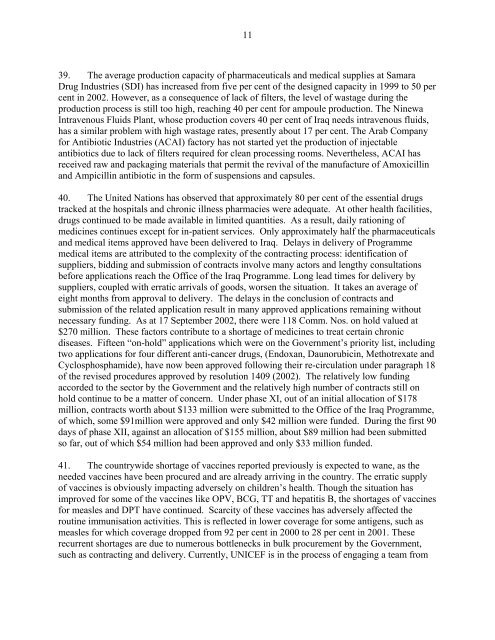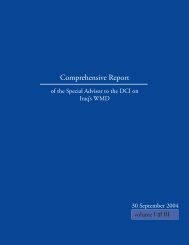I. Introduction II. Revenue generation
I. Introduction II. Revenue generation
I. Introduction II. Revenue generation
You also want an ePaper? Increase the reach of your titles
YUMPU automatically turns print PDFs into web optimized ePapers that Google loves.
1139. The average production capacity of pharmaceuticals and medical supplies at SamaraDrug Industries (SDI) has increased from five per cent of the designed capacity in 1999 to 50 percent in 2002. However, as a consequence of lack of filters, the level of wastage during theproduction process is still too high, reaching 40 per cent for ampoule production. The NinewaIntravenous Fluids Plant, whose production covers 40 per cent of Iraq needs intravenous fluids,has a similar problem with high wastage rates, presently about 17 per cent. The Arab Companyfor Antibiotic Industries (ACAI) factory has not started yet the production of injectableantibiotics due to lack of filters required for clean processing rooms. Nevertheless, ACAI hasreceived raw and packaging materials that permit the revival of the manufacture of Amoxicillinand Ampicillin antibiotic in the form of suspensions and capsules.40. The United Nations has observed that approximately 80 per cent of the essential drugstracked at the hospitals and chronic illness pharmacies were adequate. At other health facilities,drugs continued to be made available in limited quantities. As a result, daily rationing ofmedicines continues except for in-patient services. Only approximately half the pharmaceuticalsand medical items approved have been delivered to Iraq. Delays in delivery of Programmemedical items are attributed to the complexity of the contracting process: identification ofsuppliers, bidding and submission of contracts involve many actors and lengthy consultationsbefore applications reach the Office of the Iraq Programme. Long lead times for delivery bysuppliers, coupled with erratic arrivals of goods, worsen the situation. It takes an average ofeight months from approval to delivery. The delays in the conclusion of contracts andsubmission of the related application result in many approved applications remaining withoutnecessary funding. As at 17 September 2002, there were 118 Comm. Nos. on hold valued at$270 million. These factors contribute to a shortage of medicines to treat certain chronicdiseases. Fifteen “on-hold” applications which were on the Government’s priority list, includingtwo applications for four different anti-cancer drugs, (Endoxan, Daunorubicin, Methotrexate andCyclosphosphamide), have now been approved following their re-circulation under paragraph 18of the revised procedures approved by resolution 1409 (2002). The relatively low fundingaccorded to the sector by the Government and the relatively high number of contracts still onhold continue to be a matter of concern. Under phase XI, out of an initial allocation of $178million, contracts worth about $133 million were submitted to the Office of the Iraq Programme,of which, some $91million were approved and only $42 million were funded. During the first 90days of phase X<strong>II</strong>, against an allocation of $155 million, about $89 million had been submittedso far, out of which $54 million had been approved and only $33 million funded.41. The countrywide shortage of vaccines reported previously is expected to wane, as theneeded vaccines have been procured and are already arriving in the country. The erratic supplyof vaccines is obviously impacting adversely on children’s health. Though the situation hasimproved for some of the vaccines like OPV, BCG, TT and hepatitis B, the shortages of vaccinesfor measles and DPT have continued. Scarcity of these vaccines has adversely affected theroutine immunisation activities. This is reflected in lower coverage for some antigens, such asmeasles for which coverage dropped from 92 per cent in 2000 to 28 per cent in 2001. Theserecurrent shortages are due to numerous bottlenecks in bulk procurement by the Government,such as contracting and delivery. Currently, UNICEF is in the process of engaging a team from
















